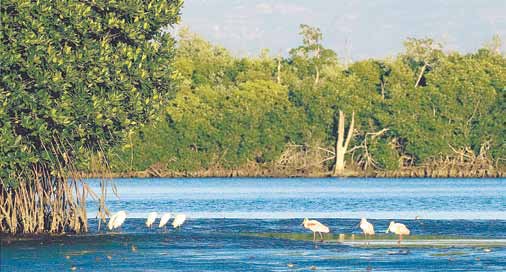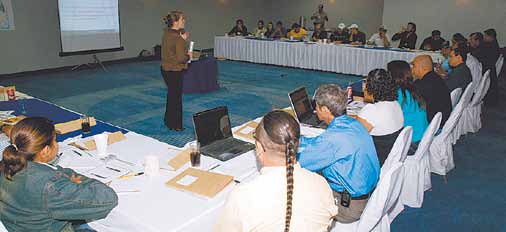 Mangrove species are classified as an endangered species according to the latest Mexican environmental law NOM-059-2010 (Photo: Ernesto Boledo)
Mangrove species are classified as an endangered species according to the latest Mexican environmental law NOM-059-2010 (Photo: Ernesto Boledo)Once upon a time, there was a small mangrove growing along the shore of a beautiful blue sea. Next to the little one were other larger trees. In their branches were many birds, and underwater, within their roots, small animals like fish, crustaceans and molusks reproduced.
The little mangrove, on seeing all the commotion caused by the birds up in the trees became more and more excited and finally asked its friends:
“Hey, when I grow up, will there be as many animals living in me as in you?”
And its friends answered:
“Of course, little one. You’ll be as big as, or even bigger than, us and you will be able to give refuge to many animals just like we do. You’ll even be able to watch some birds grow up within your branches.”
The little mangrove tree replied:
“Wow, how I wish that time would fly and I’d get bigger. I’m still too small to shelter the birds that bring joy to my day and keep me company at night.”
To which one of its friends responded:
“Don’t worry little one. You’ll be a big mangrove very soon.”
Years went by and the small mangrove eventually became a large tree. Its mangrove friends told it:
“See, little one, just like we told you years ago, today you are a big mangrove too. Besides being a cozy home for other animals, you are a beautiful sight to these waters that give us life.”
 Mangrove species are classified as an endangered species according to the latest Mexican environmental law NOM-059-2010 (Photo: Ernesto Boledo)
Mangrove species are classified as an endangered species according to the latest Mexican environmental law NOM-059-2010 (Photo: Ernesto Boledo) Fishing cooperatives, service providers, and ejido members are part of the initiative. (Photo: Ernesto Bolado Martínez)
Fishing cooperatives, service providers, and ejido members are part of the initiative. (Photo: Ernesto Bolado Martínez)Guaymas, Sonora – Ten community groups from the Gulf of California region agreed to receive training and to work on their business plans in order to improve or establish socially and environmentally responsible businesses within their area.
At the end of 2010, the non-profit organization SuMar-Voces por la Naturaleza, with assistance and guidance from the NGOs CEDO, COBI, CONSELVA, REDES, RED and MANGLAR, organized a workshop “Responsible Community Businesses,” where community groups identified and formed alliances in the interest of starting or improving their businesses.
Amanda Lejbowicz, representative of New Ventures México (NVM), explained the nature and usefulness of the business plan, which is made up of: a summary of the factors that lead to success: competitive advantages; the business objectives; the work plan; the organizational structure; and human resources.
To reinforce these concepts in actual practice, Machángles Carvajal, founding member of SuMar, gave a presentation on a study done by the NGO titled “Responsible Community Businesses: an Analysis of Case Studies and Lessons Learned.”
José de Jesús (Josele) Varela, director of Kuyimá, one of best known ecotourism businesses in Mexico, talked of his 25 years of experience. He emphazised their success at being able to retain more than 50
A field trip to Perlas del Mar de Cortez rounded out the workshop with more practical lessons gained from functional businesses. Enrique Arizmendi, one of Perla’s owners, talked about the company’s history and technical processes and discussed how the concepts learned from SuMar and NVM's workshop had been applied. The cultivated pearl business, winner of awards for excellency in marketing and finances, is an outstanding example of success in the creation of an eco-friendly product.